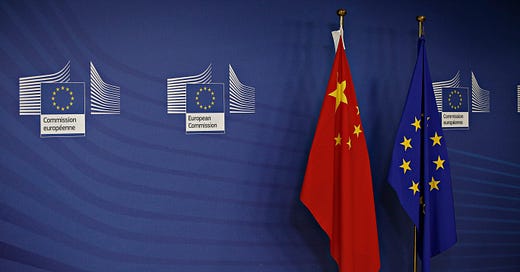PREAMBLE
The week that was covered the EU de-risking overture to China's global commodity supply chain processes.
Today’s essay continues with this genre to horn on a new instalment of Fudan University’s China-Europe Watch. There shall be an attempt in assessing the implications for EU-China relations of the European Council’s “conclusions on China” dated June 30.
One needs to emphasize that although a perceivable softening of tones with reference to the recent Europe Commission’s pronouncements on China, however, there is still elements of uncertainty floating around.
Chinese scholars are aware that the EU’s growing emphasis on its competition and systemic rivalry with China is probably here to stay. Often pounded is that question on how does one move forward from here? How can both sides preserve sufficient space for the cooperative elements in their relationship? And, of course, how to prevent the EU from aligning itself too closely with the US’s China policy?
One needs to acknowledge that these scholars believe that both sides need to rethink their approaches to one another and - towards betterment of harmonious relationships ahead - provide a few suggestions on this ensuing matter.
Jian Junbo (简军波) – Associate Professor and Deputy Director of the Centre for China-Europe Relations, Fudan University:
“The difference in the way China and the EU present their policies towards one another – with the EU emphasising differences and conflicts, and China emphasising similarities and cooperation – reflects diametrically opposed ways of thinking about their bilateral relations: China hopes to reduce the risk of conflict [冲突] by looking for space for cooperation through a search for common ground while retaining differences [求同存异]; while the European side hopes that by facing problems squarely, it will find opportunities for their resolution, which will then lay the groundwork for potential cooperation. Faced with this difference, both sides may need to take a step back from their respective approaches and find a real common denominator so as to stabilise and continue to promote the development of China-EU relations. In other words, at the same time as it underlines its differences [with China], the EU should attach importance to the space for cooperation between both sides. As for China, it could respond appropriately to the EU's emphasis on differences, particularly in view of the fact that the international landscape is undergoing major changes [Note: By ‘changes’ Jian is referring to US-China rivalry and tensions as well as the general instability of the world that his country is now facing]. In order to adapt to these dramatic changes, we could adjust the wording of our policies towards the EU in an appropriate manner and [find a] suitable way to look [more] squarely at the differences and contradictions between both sides.”
“When it comes to [taking] concrete actions in our policy towards the EU, there are two areas that we could work on:”
“First, there is something to be done when dealing with the EU’s ‘de-risking’ [policy]. ‘De-risking’ is a deliberate strategy by the EU to blur its policy towards China in order to maintain both flexibility and the initiative when managing its relations with China. In this regard, it will be difficult for the EU to meet our demand that the boundaries of its de-risking [policy] be clarified (i.e., [having] a clear ‘negative list’ in our bilateral relations), and there is also no room for bilateral discussions [on this matter]. However, if we were to focus on the area of [EU-China] cooperation, both sides could, through negotiation and coordination, establish a ‘positive list’ [for such] cooperation. This would [help] prepare us to withstand the uncertainty brought about by the EU's ‘de-risking’ policy.”
“Second, we could make more specific proposals on how to support European ‘strategic autonomy’. This is not an easy task since European ‘strategic autonomy’ [also] implies counterbalancing China (as in the case of its Indo-Pacific strategy) and it is obvious that our support for European strategic autonomy cannot include this [aspect]. That being said, the EU is not interested in our support for its autonomy [if merely viewed] as a means of counterbalancing the United States. Thus our overemphasis on its anti-US dimension will ultimately cause the EU to reject our support, [thereby] losing [even] more room for cooperation. Therefore, our support for European strategic autonomy can begin in areas that are not strongly associated with the United States and China. By doing so [we will] eventually help them achieve their independence and autonomy, [and thus help them] become a counterbalancing pole of power to the United States. To this end, we could support the EU's strategic autonomy in a number of areas, such as multilateralism,
in the digital [sphere], global governance, setting standards and so on, and by doing so expand the depth and breadth of our bilateral cooperation [with the EU].”
“Looking ahead, [we can] remain cautiously optimistic about China-EU relations. During the Russo-Ukrainian conflict, Europe has been extremely afraid that China might form an alliance with Russia. Thus, it will not be adopting extreme policies that [might] overly provoke China, so as not to push China completely towards Russia. [But] once the Russo-Ukrainian conflict is over, and regardless of the outcome for Russia, the EU (and Europe [in general]) will not fall apart and will become bolder in adopting [more] radical policies towards China, as it will no longer be worried about China's stance towards Russia. However, as China-EU cooperation at the level of trade and international governance remains indispensable, the future of China-EU relations is set for a highly complex and bumpy ride.”
A reposting from Sinification, 21/07/2023.




